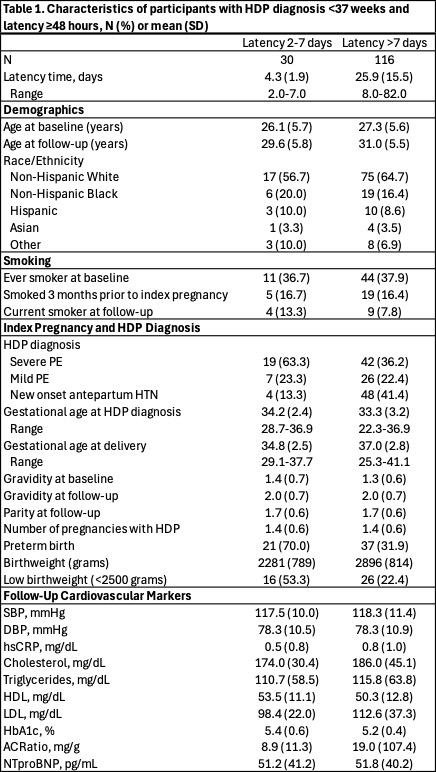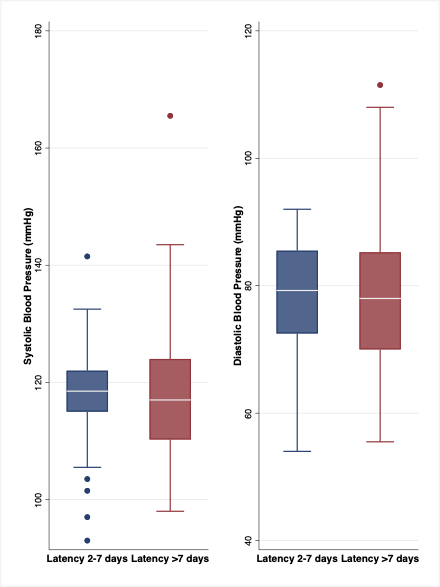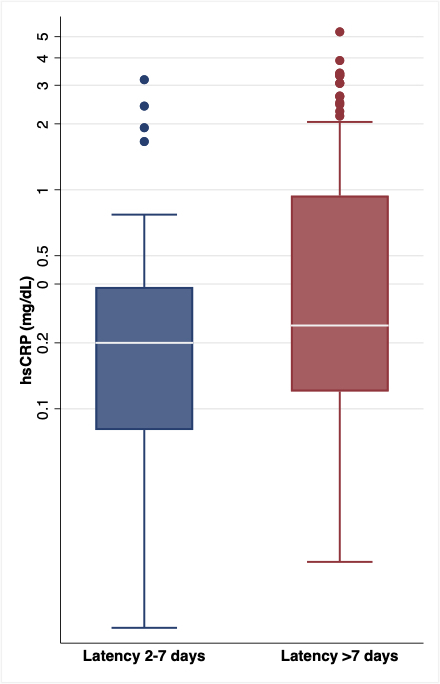Final ID: P2144
The Duration of Expectant Management During Hypertensive Disorders of Pregnancy and Blood Pressure 2-7 Years After Delivery
Abstract Body: Expectant management of preterm pregnancies with hypertensive disorders (HDP), such as preeclampsia (PE), is standard practice for neonatal benefit, although the effects on the maternal cardiovascular (CV) system from longer exposure to endothelial inflammation is uncertain. Latency of expectant management is the time from HDP diagnosis to delivery. Studies from administrative databases suggest a higher rate of adverse CV outcomes several years post-pregnancy with latency >7 days. Using the nuMoM2b-HHS (Nulliparous Pregnancy Outcomes Heart Health Study) cohort, we evaluated the relation between latency in nulliparas expectantly managed with HDP and mean systolic and diastolic blood pressure (BP) 2-7 years post-pregnancy. In the primary study (nuMoM2b), pregnancy diagnoses and outcomes were prospectively ascertained and biospecimens were obtained. We included those with HDP (PE with or without severe features, and gestational HTN) diagnosed <37 weeks. Latency was defined as short (2-7 days) or long (>7 days). We excluded those with chronic hypertension (HTN) or pregestational diabetes at index pregnancy, if exposure or outcome data were missing from the index pregnancy or HHS visit, or if latencies were implausible based on timing of diagnosis and delivery. We used linear regression models to examine the association between latency with BP and markers of CV risk (high-sensitivity CRP (hs-CRP), lipids, HgbA1C, NTproBNP, and ACC/AHA CV risk score) obtained 2-7 years post-pregnancy. We planned a sensitivity analysis of those with early-onset HDP (diagnosis <34 weeks). 150 participants, 32 with short and 118 with long latency, met inclusion criteria (Table 1). BP at HHS follow-up was not different by latency duration (Table 1, Fig 1). hs-CRP was significantly higher in those with long latency, including after adjustment for confounders (age, race, BMI, baseline CV markers, gestational diabetes, small for gestational age infant, and smoking [Fig 2]). The other markers of CV risk were not statistically different between groups [Table 1]. In sensitivity analysis, BP was not different between groups; however, hs-CRP was significantly higher in the longer latency group. In this cohort of prospectively adjudicated pregnancy outcomes, longer latency in those with expectantly managed preterm HDP was not associated with overall differences in CV risk, including BP 2-7 years after a first delivery. The finding of elevated hs-CRP warrants follow-up in a larger cohort.
More abstracts on this topic:
A Measure of Residential Segregation and Thrombo-inflammation in Black and White Americans
Manogaran Erin, Cushman Mary, Kamin Mukaz Debora, Sparks Andrew, Packer Ryan, Brochu Paige, Judd Suzanne, Howard Virginia, Plante Timothy, Long Leann, Cheung Katherine
ACS-Specific Gut Microbial and Metabolic Profiles Reveal Diagnostic and Recovery MarkersXu Jing, Fu Jingyuan, Dai Die, Yang Yanan, Yang Jingang, Gao Shanshan, Wu Chongming, He Jiumin, Chen Weihua, Yang Yue-jin



